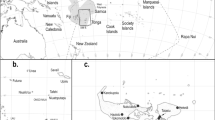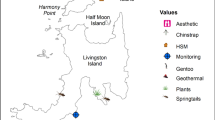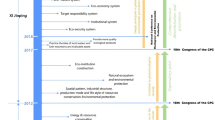Abstract
With a few notable exceptions, urban garden scholarship tends to be either celebratory or critical of the role urban gardens play in wider political, social, cultural, economic and ecological dynamics. Drawing on urban political ecology scholarship, this article explores the question of nature within scholarship on urban gardens. I argue that failing to adequately scrutinize the co-constitutive character of nature and society has led some scholars to overlook the potential for urban gardens to achieve broader socio-political goals, and led others to overstate the potential. Employing a political ecology approach to urban garden analysis clarifies the material and discursive role of nature in urban garden practice, and ultimately contributes to untangling the potential and limits of urban gardens as sites of socio-political change.
Similar content being viewed by others
Notes
For the past two summers, I have tended a 140 square foot garden in the front yard of my apartment in Toronto, Ontario. I have previously grown vegetables in Windsor, Ontario and Calgary, Alberta in urban garden projects I helped launch in each city.
As one anonymous reviewer rightly pointed out, questions of urban gardens and alternative urban food politics are inevitably intertwined with the multiple and competing claims to urban space, and thus linked to themes of food access, inequality and marginalization. I agree wholeheartedly but leave a more thorough treatment of this question of space to subsequent work and authors. For a stellar review of ‘food politics’ see Levkoe (2011).
References
Alaimo, K., E. Packnet, R. Miles, and D. Kruger. 2008. Fruit and vegetable intake among urban community gardeners. Journal of Nutritional Education and Behavior 40(2): 94–101.
Alkon, A.H. 2013. The socio-nature of local organic food. Antipode 45(3): 663–680.
Allen, P., and J. Guthman. 2006. From ‘old school’ to ‘farm-to-school’: Neoliberalization from the ground up. Agriculture and Human Values 23: 401–415.
Armstrong, D. 2000. A survey of community gardens in upstate New York: Implications for health promotion and community development. Health and Place 6: 185–202.
Baker, E.L. 2005. Tending cultural landscapes and food citizenship in Toronto’s community gardens. The Geographical Review 94(3): 305–325.
Bakker, K. 2010. The limits of ‘neoliberal natures’: Debating green neoliberalism. Progress in Human Geography 34(6): 715–735.
Blaikie, P., and H.C. Brookfield. 1987. Land degradation and society. New York, NY: Methuen.
Castree, N. 2001. Socializing nature: Theory, practice and politics. In Social nature: Theory, practice, politics, ed. N. Castree, and B. Braun, 1–20. London: Routledge.
Castree, N., and B. Braun (eds.). 2001. Social nature: Theory, practice, politics. London: Routledge.
Cronon, W. 1991. Nature’s metropolis: Chicago and the Great West. New York, NY: W.N. Norton and Company.
DeFilippis, J., R. Fisher, and E. Shragge. 2010. Contesting community: The limits and potential of local organizing. New Jersey: Rutgers University Press.
DeLind, B.L. 2001. Place, work and civic agriculture: Common fields for cultivation. Agriculture and Human Values 19: 217–224.
DeLind, B.L. 2011. Are local food and the local food movement taking us where we want to go? Or are we hitching our wagons to the wrong stars? Agriculture and Human Values 28(2): 273–283.
Ferris, J., C. Norman, and J. Sempik. 2001. People, land and sustainability: Community gardens and the social dimension of sustainable development. Social Policy and Administration 35(5): 559–568.
Fusco, D. 2001. Creating relevant science through urban planning and gardening. Journal of Research in Science and Teaching 38: 860–877.
Gandy, M. 2002. Concrete and clay: Reworking nature in New York City. Cambridge: MIT Press.
Glover, T., K. Shinew, and D. Parry. 2005. Association, sociability, and civic culture: The democratic effect of community gardening. Leisure Sciences 27: 75–92.
Gottlieb, R., and A. Fisher. 1996. Community food security and environmental justice: Searching for a common discourse. Agriculture and Human Values 3(3): 23–32.
Grunderson, R. 2014. Problems with the defetishization thesis: Ethical consumerism, alternative food systems, and commodity fetishism. Agriculture and Human Values 31(1): 109–117.
Guthman, J. 2008. Neoliberalism and the making of food politics in California. Geoforum 38: 1171–1183.
Harvey, D. 1996. Justice, nature and the geography of difference. Malden, MA: Blackwell.
Heynen, N., M. Kaika, and E. Swyngedouw (eds.). 2006. In the nature of cities: Urban political ecology and the politics of metabolism. New York, NY: Routledge.
Holt-Giménez, E., and Y. Wang. 2011. Reform or transform? The pivotal role of food justice in the US food movement. Race/Ethnicity: Multidisciplinary Global Contexts 5(1): 83–102.
Jacobs, J. 1992 [1961]. The death and life of great American cities. New York: Vintage Books.
Kaika, M. 2005. City of flows: Modernity, nature and the city. New York, NY: Routledge.
Kingsley, J., and M. Townsend. 2006. “Dig in” to social capital: Community gardens as mechanisms for growing urban social connectedness. Urban Policy and Research 24(4): 525–537.
Kloppenburg, J. 2004. First the seed: The political economy of plant biotechnology. Madison, WI: The University of Wisconsin Press.
Kloppenburg, J. 2010. Impending dispossession, enabling repossession: Biological open source and the recovery of seed sovereignty. Journal of Agrarian Change 10(3): 367–388.
Lawson, L. 2005. City bountiful: A century of community gardening in America. Berkley, CA: University of California Press.
Levkoe, C. 2011. Toward a transformative food politics. Local Environment 16(7): 687–705.
Liu, D., J. Trumble, and R. Stouthamer. 2006. Genetic differentiation between eastern populations and recent introductions of potato psyllid (Bactericera cockerelli) into western North American. Entomologia Experimentalis et Applicata 118(3): 177–183.
Lyson, T.A. 2000. Moving toward civic agriculture. Choices 15(3): 42–45.
Lyson, T. 2004. Civic agriculture: Reconnecting farm, food, and community. Medford, MA: Tufts University Press.
Mann, S., and J. Dickinson. 1978. Obstacles to the development of a capitalist agriculture. Journal of Peasant Studies 5(4): 466–481.
McClintock, N. 2010. Why farm the city? Theorizing urban agriculture through a lens of metabolic rift. Cambridge Journal of Regions, Economy and Society 3: 191–207.
McClintock, N. 2014. Radical, reformist, and garden-variety neoliberal: Coming to terms with urban agriculture’s contradictions. Local Environment 1–25. doi:10.1080/13549839.2012.752797.
Ohmer, M., P. Meadowcroft, K. Freed, and E. Lewis. 2009. Community gardening and community development: Individual, social and community benefits of a community conservation program. Journal of Community Practice 17(4): 377–399.
Peck, J., and A. Tickell. 2002. Neoliberalizing space. Antipode 34(3): 380–404.
Philo, C., and J. Wolch. 1998. Through the geographical looking glass: Space, place and human–animal relations. Society and Animals 6: 103–118.
Prole, A., and M. Gray. 2013. Farming alone? What’s up with the “C” in community supported agriculture? Agriculture and Human Values 30(1): 85–100.
Prudham, S. 2007. The fictions of autonomous invention: Accumulation by dispossession, commodification and life patents in Canada. Antipode 39(3): 406–429.
Pudup, M.B. 2008. It takes a garden: Cultivating citizen-subjects in organized garden projects. Geoforum 39: 1228–1240.
Rosol, M. 2012. Community volunteering as neoliberal strategy? Green space production in Berlin. Antipode 44(1): 239–257.
Sbicca, J. 2013. The need to feed: Urban metabolic struggles of actually existing radical projects. Critical Sociology 1–18. doi:10.1177/0896920513497375.
Schmelzkopf, K. 2002. Incommensurability, land use, and the right space: Community gardens in New York City. Urban Geography 23: 323–343.
Schmelzkopf, K. 1995. Urban community gardens as contested space. Geographical Review 85: 364–381.
Schnell, S.M. 2013. Food miles, local eating, and community supported agriculture: Putting local food in its place. Agriculture and Human Values 20(4): 615–628.
Schupp, J.L., and J.S. Sharp. 2012. Exploring the social basis of home gardening. Agriculture and Human Values 29(1): 93–105.
Smith, N. 2008. Uneven development: Nature, capital, and the production of space, 3rd ed. Athens, GA: University of Athens Press.
Sumner, J. 2009. Sustainable horticulture and community development: More than just organic production. Journal of Sustainable Agriculture 33(4): 461–483.
Swyngedouw, E. 1997. Power, nature, and the city. The conquest of water and the political ecology of urbanization in Guayaquil, Ecuador: 1880–1990. Environment and Planning A 29(2): 311–332.
Swyngedouw, E. 1999. Modernity and hybridity. Annals of the Association of American Geographers 89: 443–465.
Swyngedouw, E. 2004. Glocalisations. Philadelphia, PA: Temple University Press.
Swyngedouw, E., and N. Heynen. 2003. Urban political ecology, justice and the politics of scale. Antipode 35(5): 898–918.
Swyngedouw, E., and M. Kaika. 2000. Fetishizing the modern city: The phantasmagoria of urban technological networks. International Journal of Urban and Regional Research 24(1): 120–138.
Teulon, D.A., P.J. Workman, K.L. Thomas, and M.C. Nielsen. 2009. Bactericera cockerelli: Incursion, dispersal and current distribution on vegetable crops in New Zealand. New Zealand Plant Protection 62: 136–144.
Trumble, J., and C. Butler. 2009. Climate change will exacerbate California's insect pest problems. California Agriculture 63(2): 73–78.
Twiss, J., J. Dickinson, S. Duma, T. Kleinman, and H. Paulsen. 2003. Community gardens: Lessons learned from California healthy cities and communities. American Journal of Public Health 9(9): 1435–1439.
Veron, R. 2006. Remaking urban environments: The political ecology of air pollution in Delhi. Environment and Planning A 38: 2093–2109.
Wakefield, F., F. Yeudall, C. Taron, J. Reynolds, and A. Skinner. 2007. Growing urban health: Community gardening in south-east Toronto. Health Promotion International 22(2): 92–101.
Wolch, J. 2002. Anima urbis. Progress in Human Geography 26(2): 721–742.
Wolch, J., and J. Emel. 1995. Theme issue on ‘bringing the animals back in’. Environment and Planning D: Society and Space 13: 631–760.
Wolch, J., and J. Emel (eds.). 1998. Animal geographies; Place, politics and identity in the nature–culture borderlands. London: Verso.
Acknowledgments
I’d like to thank Dr. Gerda Wekerle for providing feedback on an earlier version of this article. My deep gratitude also goes to Dr. Harvey James and four anonymous reviewers for their insightful, constructive and helpful comments. Any shortcomings of the piece remain mine alone.
Author information
Authors and Affiliations
Corresponding author
Rights and permissions
About this article
Cite this article
Classens, M. The nature of urban gardens: toward a political ecology of urban agriculture. Agric Hum Values 32, 229–239 (2015). https://doi.org/10.1007/s10460-014-9540-4
Accepted:
Published:
Issue Date:
DOI: https://doi.org/10.1007/s10460-014-9540-4




